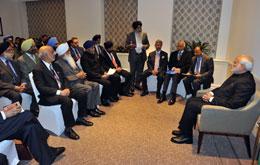No blanket approval for Sikhs on India’s blacklist

The Indian spy agency has opposed a proposal relaxing visa restrictions on overseas Sikhs, including several in Canada, whose names figure in a secret “blacklist”, maintained by the government, a senior government official said.
A delegation of British Sikhs met Prime Minister Narendra Modi in London last month and raised the demand for removing the names of Sikh individuals from the list, which bars them from travelling to India.
As per government records, there are 43 Sikh individuals, who are residents of U.K, Germany, Canada, whose names are included in this list.
The Indian Intelligence Bureau (IB) has opposed the Prime Minister’s Office saying there should be no blanket clearance of names included in the list and entry restrictions to India should be lifted only on a case by case basis.
IB has also suggested that the visiting Sikhs should be asked to “sign an oath of allegiance to the Constitution” before being allowed back into their homeland.
The revival of Sikh extremism has become a cause of concern for the intelligence agencies as well the government after a series of incidents of sacrilege of the Granth Sahib, the holy book of the Sikhs, was reported in Punjab over the past few months. The incidents led to communal tension in many parts of the State. Though the State government blamed a “foreign-hand” for the violent incidents, the Ministry of Home Affairs (MHA) in a reply to the Indian Parliament last week said they did not have any such information.
Sikh groups have submitted representations to Prime Minister Narendra Modi at various platforms; their efforts during his visit to the UK resulted in an assurance that the government would look into their demands. The PMO sent the proposal to the IB for its opinion.
“With elections due in Punjab, we expect a resurrection of separatist movement in the State. If the restrictions on blacklisted individuals are lifted en masse then it could have a disastrous impact on internal security. There is a reason why those names are there,” said a senior government official.
The South Asian Post had reported earlier this year, that chief minister of Punjab, where hundreds of thousands of Canada’s South Asians hail from, is calling for the early release of convicts and exiles linked to terror organisations.
Parkash Singh Badal’s call for the release of Sikh convicts, including the assassins of former Punjab chief minister Beant Singh, has worried the intelligence agencies in India and elsewhere.
Indian media reported that the Punjab government’s decision to back groups demanding the release of militants is dangerous, and noted that such a move could stoke passions and revive Sikh militancy around the globe.
Badal has written a letter to state governments in Indian demanding the premature release of 13 terrorists, where they are currently being held.
In addition Badal also wants restrictions placed on Sikhs abroad who have been banned from returning to their homeland, lifted.
Among those on the so-called blacklist is Ajaib Singh Bagri, the fiery Indo-Canadian preacher from Kamloops, B.C. who was acquitted of the Air India bombing.
Bagri was also charged with the 1988 attempted murder of Tara Singh Hayer, the publisher of the Indo-Canadian Times. The case against Bagri was stayed in January 2004. Hayer was shot and killed in 1998. His murder hasn’t been solved. He would have been a witness at the Air India trial.
Others overseas include Gurmit Singh Aulakh and Ganga Singh Dhillon both US citizens who set up Khalistan Government-in-exile, Avtar Singh alias Tari of the outlawed Khalistan Liberation Force(KLF), Shingara Singh and Resham Singh, both top Babbar Khalsa leaders settled in France and Germany.
None of them are wanted in any criminal case in India.
The Indian government blacklisted many Sikhs involved in anti-India propaganda and vandalism following the infamous Operation Bluestar of 1984. The Indian army at that time stormed the Golden Temple, the holiest shrine of the Sikhs in Amritsar, Punjab, to flush out the armed religious extremists, who had fortified the place of worship.
The operation infuriated Sikhs across the world, compelling idealistic, emotional youths to join militant ranks. There were angry protests in Vancouver as well, where several men vandalized the Indian consulate office. Subsequently, the government of India blacklisted Sikhs involved in separatist activities, citing security concerns.
Although no official record is available to suggest how many Sikh rebels are on the blacklist, most of the Sikh exiles are now primarily settled in Canada. Others are in the U.S., Britain, France and Germany.
The now defunct South Asian Human Rights’ Group (SAHRG), which campaigned for the blacklistees’ cause, estimates that between 70 to 80 Sikhs living in Western Canada have been denied an Indian passport or visas by the Indian government.









